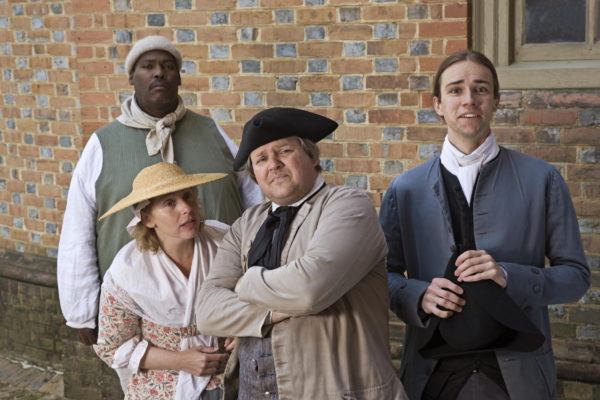
“We get that this is a weird job,” says Nicole Brown, who portrays Hannah Powell on the streets of Williamsburg. She and her colleagues know all too well that speaking to someone who is “living” in the 18th century is outside the comfort zone for many people. Which is why I asked a group of our talented folks to tell me what advice they would offer guests who may be reluctant to engage the living part of this historic town.
Here’s what they told me, more or less in their own words…
#1 Embrace the unknown
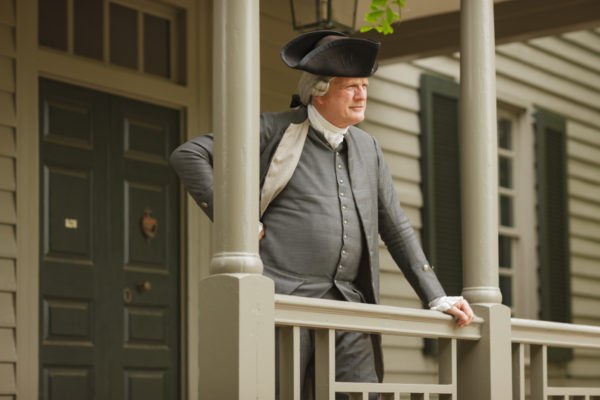
“You’re not traveling to your past, you’re traveling to our present.”—Gerry Underdown, as Robert Carter III
The past is another country. Like any foreign land you might travel to, it’s natural to have some assumptions about what it’s like. In the case of Colonial Williamsburg, your assumptions may come from your high school history class, or what you heard from a friend who has visited. We encourage you to bring your natural curiosity and be prepared to enlarge or revise your thinking.
#2 Put the screen down
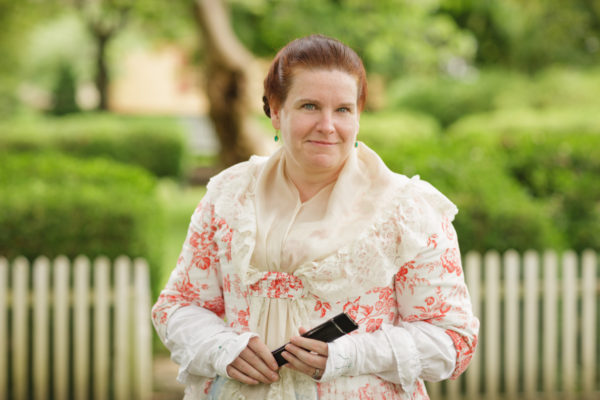
Sharon Hollands portrays Elizabeth Braxton
It’s hard to immerse yourself in the 18th century if there is a screen between you and an interpreter. Don’t let yourself get distracted taking photos or texting. There will be plenty of opportunities to pull your phone or camera, but you’ll have more fun if you set it aside for at least a little bit.
Remember, we’re not just models for vacation pictures, we want to talk to you.
#3 Start a conversation on the right foot
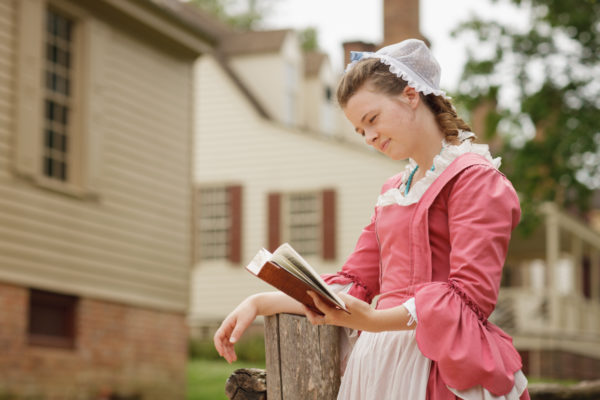
“You can ask difficult questions, because that’s what our job is.” –Emily Doherty, portraying a young woman of Williamsburg
Begin a conversation just like you would with any stranger: exchange some small talk. Share some pleasantries. Just say Good Day, ask how they are doing, or where they are from. Comment on the weather.
Pick up some tips about how to speak like a colonial Virginian
Some guests hesitate, especially in potentially sensitive situations. Perhaps they wonder if an African American interpreter is portraying an enslaved person (after all, about half of the colonial capital’s residents in the 1700s were indeed enslaved). But you don’t need to address an African American interpreter any differently than one portraying a Cherokee or a future president.
Just say hello, and rather than ask, “Who are you supposed to be?” try something like, “What are you doing about the city today?”
Simply being polite goes a long way.
#4 Let your guard down
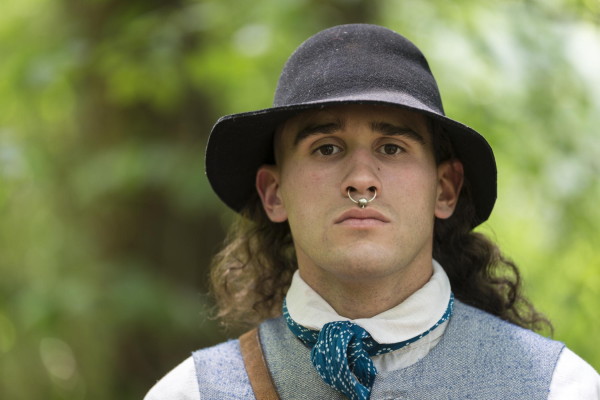
“Don’t let my nose ring scare you. Rather, ask why I have it; there’s a good reason!” -Warren Taylor as Robert Mush
Let go of the present and go into the moment.
Colonial Williamsburg’s interpreters think of themselves as “playful scholars,” people who are deeply committed to conveying their passions to you. Every interpreter has different interests and expertise. Immerse yourself in the past, don’t worry about what is going to happen in the future.
Play the game by letting us be your guide. Bring your own perspective. Are you a visitor from the Ohio frontier in Williamsburg to do some trading? That’s fine. We’ll meet you wherever you want, and help you be whomever you want.
At the same time, we know this isn’t actually the 18th century, it’s a representation of it. We know they didn’t have street signs or credit card machines. We also know it smelled a lot, um, more.
#5 Ask us anything
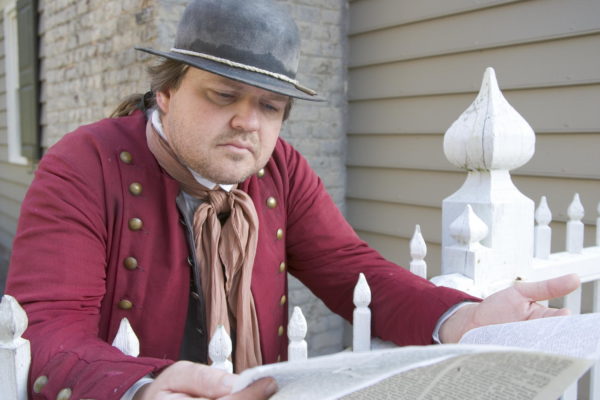
“You don’t have to ask us about the fate of America. Ask me how I met my wife, or my pet’s name.”-Bill Rose
We’re all afraid of feeling dumb sometimes. Even when your high school teachers insisted there are no dumb questions, you never really believed them, did you? Well, you can believe it here.
We know that many of our guests have little frame of reference for an 18th-century world, and that means that sometimes they have to take a risk to make a connection.
But we know that you’re calling up whatever frame of reference you have and trying to make connections. And we appreciate it! So start with something simple, and work your way toward deeper questions.
Don’t be afraid to ask hard questions, either. Even if we don’t know the answer, we probably know who does, and it’s bound to lead to an interesting conversation in any case.
And if you need to ask Martha Washington where to find a restroom, don’t hesitate. She won’t mind.
#6 Say yes
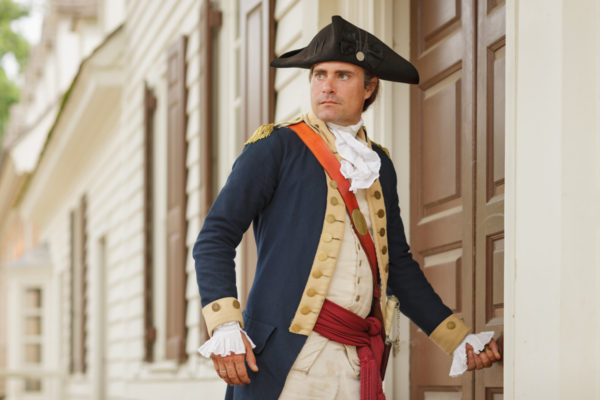
“Don’t be surprised if I act like I know you.” -Nat Lasley as Col. James Innes
If we ask you to join us in a conversation, or a game, or just to hold something, say yes. Trust us, and we promise not to let you look foolish.
We’re not trying to trick anyone, so believe our sincerity in helping you make the leap back in time. We appreciate the effort!
When you’re watching us, we’re watching you too. We generally know when to leave you alone, and we certainly respect you for choosing to spend your time and money visiting us.
#7 Make connections
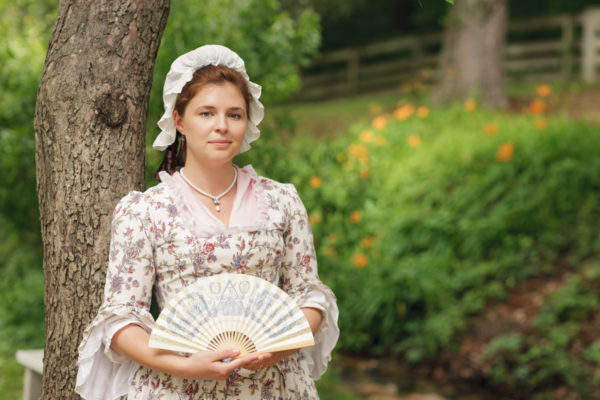
“Please ask me about Hannah’s shoe size.”-Nicole Brown, portraying Hannah Powell
It’s ok to talk to us more than once during the day. We’re not following a script (at least most of the time), we’re having conversations, so you can always come back and see us again, to continue a discussion, ask a follow-up question, or get another picture. You might be surprised that we remember you!
As you meet people during the day, try to put some of the historical pieces together. Make connections by figuring out how we relate to each other. What’s on everyone’s mind? Do the issues resonate today? And why is Mrs. Braxton so annoyed with Mr. Purdie?
Have fun connecting the dots.
One final point. There are more than a hundred costumed interpreters, but not everyone is interpreting a specific person. Some are tradespeople, of course, who are not really “living” in the 18th century. Other people in costume are primarily guides, but many still take on a character. But that doesn’t need to affect the way you talk to any of us. We’re all here to help you have a wonderful time.
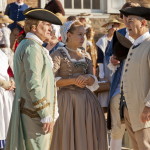
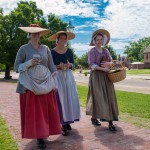
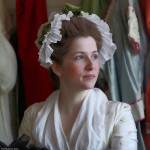
I have such a fetish for men in 18th c naval uniforms. If I could pluck up the courage to approach them I’d most likely ask if they were single.
Great article. I have done any LH in years, and years, but the principles here hold true now as well as then.
Back in the 80’s (Um, the 1980’s ) I worked as a craft interpreter summers during college. I loved it, so many people where hesitant to engage the first person interpreters and we got so many of their questions. I don’t miss the weekend work but I sure enjoyed the work itself.
These are some great tips, both for visitors who may be intimidated and for reenactors who are not sure how to handle the concept of first person interpretation. I might just get up the nerve to try it one of these days!
Don’t be afraid to ask questions. I love going to CW but sometimes I get confused about what year or occurrence we’re “living in” or to what they’re referencing. Remembering your humility and kindness, just ask the interpreters to clarify what is going on in town or discuss what they’re doing today. It always makes for a wonderful learning experience!
I visit CW 3 to 4 times a year and I usually dress in in the 18th century clothes (much of which is from CW). Knowing I am just a visitor (not an actor employee) I like to engage with the interpreters either one on one or in a short Rev City Program. If asked, I portray the proprietor of the City Tavern in Philadelphia who is in Williamsburg gaining some insights from the town’s tavern keepers.(this was an actual person). I have always found it a way to engage and learn so much history and facts from those who play the various roles as interpreters at CW. Does CW and the interpreters like when people dress as someone of that time period? Know that if a visitor approaches me, I always inform them I am a visitor too (not someone who works at CW) although usually they ask a basic question that having been there so much, I can usually answer.
Dave, That would be so much fun, dressing in the 18th C. When I see someone totally lost I ask if I can be of help. It’s usually “where is………” and I point them in the right direction and show them how to read the map. But doing that in costume would be so much fun.
Thanks for your reply Christine. So CW or the interpreters don’t frown on visitors (adults basically) from being in costume as long as they know their place as visitors.
Not to make fun of first timers on their obvious first day, but…..one of the character interpreters and I had some fun with them. John Lowe, the man who for many years, interpreted James Shields the proprietor of Shields Tavern had some fun. I guess he had gone somewhere and had to park his car in the employee lot just behind the crossover bus stop. He and I were waiting for the bus that goes around the restored area. A bus from the visitors center had come and unloaded a good number of first timers. When we boarded the bus, John took the seat right behind the driver on a long seat and I on the seat across from him. The other passengers filled most of the two person seats. Now the fun was about to begin. I looked at John and said, “Good day Mr. Shields, isn’t it a fine day for a carriage ride?” Instant silence on the bus. The “newbies” must have thought I was out of my mind. John, responded with, “Yes Madam it is a lovely day for a carriage ride. You travel alone today?” Me, “Yes Mr. Hansley had business at the Public Hospital today. We are to meet at your lovely establishment for our evening repast.” John, “Oh how wonderful. There will be good food to be had.” Me, “My I make my way to Duke of Gloucester Street through your fine garden?” John, “Of course you may. If you have the time, I’d like to show you my crop of fine tomatoes.” Me, “Oh that would be lovely.” Well, this whole conversation took place before we arrived at the first stop, The Capitol stop. The bus driver kept looking at the passengers and John and me in the inside rear view mirror. He was trying not to run off the road laughing. After all the passengers got off, the driver put the bus in park and turned to look at both of us and said, “You two are EVIL.” The three of us had a good laugh and then we continued on to the Tavern Stop. John verified that we were going to eat at the Tavern that evening. He must have given a description of me to the hostess. We were seated in a spot where he could easily bring us into the conversation so the other diners would realize the dinner was “Dinner Theater.” I miss John. He was a treasure. And yes, there are ghosts in CW. John IS watching over the Tavern. I have FELT his presence every single time I’m there.
Hate to be stupid, but what was funny about that?
Francis, this didn’t start out to be funny. It was funny more after the fact when I noticed the bus driver trying not to laugh and when he called us EVIL. My husband and I had been in CW for almost a week on our 4th CW trip and my 12th trip, so I was in the 18th C. mode of talking to interpreters. So when I saw “Mr. Shields” it was very natural to get in the mode. He was in costume and character from the moment he greeted me at the bus stop with a, “Good day Madam, I hope you are well this fine day.” And I responded accordingly, “I am well sir and yourself?” Then the bus from the visitors center arrived. The funny part was the almost instant silence that occurred and the strange looks we got from the passengers as we continued our conversation.
Interpreters need to be considerate of the fact that visitors don’t know the lingo, or the customs of the era. Too many of them leave the visitor feeling like an ass because the visitor doesn’t know how to phrase the question. Perhaps they could suggest a rephrased question? On a few occasions, I left very irritated. If the museum takes their model from Plimoth Plantation, where EVERYONE is in character, then everyone needs to be in character. Only having some in character confuses the visitor.
My wife and I have visited many times and it never gets old. As mentioned above, the people make the trip worth while. The town and the buildings are beautiful but the people make it come to life. Adding the local Indian tribes is a great addition. This spring we enguaged a young trubal member in conversation about the trades. He was genuine, informative and a credit to his race and America!
When we visited CW in early June, following a gruelling journey north from Savannah (the corduroy roads were a muddy mess), I had the opportunity to have a lovely conversation with a grey-haired shopkeeper at the Prentis Store. After discussing the Leicester Longwool sheep in the town fields and the availability of their fleece for purchase, we commiserated regarding the Crown’s imposition of tax on so many items, and wondered about the impact of any boycotts or other unpleasantness on the shop’s trade.
I understand some members of the Continental Congress, including Mr Jefferson, are hard at work writing a declaration concerning our mother country’s treatment of us. Perhaps it will be published next month? We are loyal citizens. All we want is representation in Parliament rather than taxation without representation. We in the colony of Georgia are not hotheads like those New Englanders.
OK - So why does Robert Mush have a nose ring? And, what is Hannah Powell’s shoe size?
Hannah Powell wore a no. 8 shoe size. Robert Mush was an American Indian and the nose ring is a part of his culture.
I see no reason for someone not to expect an interpreter to speak the part he or she is playing to be immersed in the 18th century. It is a living museum…the costumed interpreters do a wonderful and appropriate job. BUT the one with the nose ring is a shame.
I believe he is a native American. I believe they wore ornate jewelry. So why is he a shame?
He is portraying an American Indian. it’s both period appropriate and part of his culture
Why is is “a shame” that an interpreter portraying a Pamunkey character is dressed as that person would’ve been in the 18th century? I for one think that it’s pretty great how the American Indian Initiative has managed to expand the presence of Native American characters at CW, all the better reflecting how life would’ve really been at that time.
Having had an interest in the American Revoluton for forty years. I have questions.
How has life changed for the people of Viginia, on the farms as well as in the towns?
Can you tell me about the Loyalist?
What are the hardship that you experiance because of the War?
The war is over, whats life like know?
Wonderful and logical questions….if you are unable to ask in person in Williamsburg then by all means Brian….read. We seem to both share the same interest and my solution was to read as much as I could. You can even go on the computer and get answers to your questions. BUT then again, I think you know that so I don’t mean to be insulting.
I am an interpreter for a Historical Society and am in costume in New Jersey. I have been a docent in every State my husband and I lived in due to his corporate moves. That helped me immensely but I still read. You can find your own answers. Have fun finding them. HUZZAH!!!!!!!!!!!!!!
Since I will never be able to visit CW, I really would like to know more about the nose ring (being a former 18th c. Dutch reenactor)…